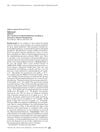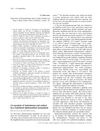 March 2023 in “Seminars in reproductive medicine”
March 2023 in “Seminars in reproductive medicine” PCOS often leads to sleep problems, especially obstructive sleep apnea, affecting overall health.
 January 2024 in “International Journal of Dermatology Venereology and Leprosy Sciences”
January 2024 in “International Journal of Dermatology Venereology and Leprosy Sciences” Patients with acne vulgaris have lower serum irisin levels.
18 citations,
September 2021 in “Journal of Neuroendocrinology” Neurosteroids can influence behavior by modulating brain inhibition, with potential for treating psychiatric disorders.
 September 2021 in “Physiology News”
September 2021 in “Physiology News” Addressing underrepresentation in Parkinson's research is crucial for better treatments and understanding.
 September 2021 in “Physiology News”
September 2021 in “Physiology News” Air Vice-Marshal Sir Ralph Jackson significantly advanced dialysis technology in the UK.
 May 2023 in “Frontiers in Immunology”
May 2023 in “Frontiers in Immunology” Treg cell-based therapies might help treat hair loss from alopecia areata, but more research is needed to confirm safety and effectiveness.
2 citations,
May 2023 in “Frontiers in Pharmacology” Natural products may help treat skin inflammation from abnormal adrenal hormones.
 1 citations,
January 2019 in “Medical principles and practice”
1 citations,
January 2019 in “Medical principles and practice” A boy's hair loss improved after tumor removal and vitamin D treatment, but hair loss returned despite normal vitamin D and no tumor regrowth.
 48 citations,
January 2000 in “Hormone Research in Paediatrics”
48 citations,
January 2000 in “Hormone Research in Paediatrics” Cytokines and neuropeptides are key in controlling androgen levels, affecting skin and hair conditions.
3 citations,
January 2017 in “Gynecological endocrinology” A postmenopausal woman's excess male hormone symptoms were caused by a rare adrenal gland tissue in her ovary.
 June 2023 in “Medicine and Pharmacy Reports”
June 2023 in “Medicine and Pharmacy Reports” A woman with a specific mutation causing adrenal gland issues faced fertility problems, but careful hormone therapy helped her manage it successfully.
 4 citations,
August 2021 in “Theriogenology”
4 citations,
August 2021 in “Theriogenology” Neurosteroids play a key role in controlling the brain-adrenal gland activity in pregnant sheep, both in normal and stressful situations.
 59 citations,
January 2010 in “International Journal of Pediatric Endocrinology”
59 citations,
January 2010 in “International Journal of Pediatric Endocrinology” NonClassic Congenital Adrenal Hyperplasia is a less severe form of a genetic disorder affecting adrenal gland function.
 24 citations,
September 2001 in “Journal of The American Academy of Dermatology”
24 citations,
September 2001 in “Journal of The American Academy of Dermatology” Women's ovarian hormones and adrenal androgens change throughout life, affecting hair loss and health.
 7 citations,
January 2014 in “Case reports in endocrinology”
7 citations,
January 2014 in “Case reports in endocrinology” A woman's excessive hair growth was caused by a rare benign tumor in her adrenal gland, which was successfully removed.
 November 2022 in “Journal of the Endocrine Society”
November 2022 in “Journal of the Endocrine Society” Long-term treatment with buprenorphine/naloxone for opioid addiction may lead to secondary adrenal insufficiency.
 October 2023 in “Journal of the Endocrine Society”
October 2023 in “Journal of the Endocrine Society” A woman's cyclic Cushing syndrome was caused by a tumor in her adrenal gland that produced ACTH.
 October 2021 in “Acta Scientific Medical Sciences”
October 2021 in “Acta Scientific Medical Sciences” A woman was diagnosed with a rare adrenal gland cancer that did not show usual hormone-related symptoms.
April 2014 in “Acta Medica Colombiana” Removing an adrenal gland tumor improved a man's blood pressure and stopped his facial hair growth.
A woman's Cushing's syndrome caused by adrenal cancer improved after surgery.
4 citations,
January 2010 in “Journal of pediatric endocrinology & metabolism/Journal of pediatric endocrinology and metabolism” In India, most patients with type 1 autoimmune polyglandular failure show symptoms in a specific order, starting with parathyroid gland issues, then yeast infections, and finally adrenal gland failure.
 16 citations,
August 2007 in “Histopathology”
16 citations,
August 2007 in “Histopathology” A woman's rare adrenal tumor caused high testosterone and cortisol levels, which normalized after the tumor was removed.
 15 citations,
August 2021 in “Reviews in endocrine and metabolic disorders”
15 citations,
August 2021 in “Reviews in endocrine and metabolic disorders” COVID-19 and hypopituitarism (reduced pituitary gland function) are linked, with the latter's related health issues potentially worsening COVID-19 outcomes, and COVID-19 possibly increasing risk for pituitary complications.
 14 citations,
July 1987 in “Dermatologic Clinics”
14 citations,
July 1987 in “Dermatologic Clinics” The document concludes that treating female hair loss should target reducing excess androgen and blocking its effects on hair follicles, with the best treatments being hormonal therapy, adrenal suppression, and topical minoxidil.
 3 citations,
May 1990 in “Journal of Steroid Biochemistry”
3 citations,
May 1990 in “Journal of Steroid Biochemistry” Some women with excess hair growth have a hormone condition that can't be diagnosed by blood or urine tests alone.
1 citations,
June 2022 in “Frontiers in Neuroanatomy” Early hormones shape sex-specific differences in rat glands.
1 citations,
May 2021 in “Journal of the Endocrine Society” A woman developed Cushing syndrome and adrenal insufficiency from using fluticasone and ritonavir together.
 1 citations,
September 2020 in “Endocrinology, Diabetes & Metabolism Case Reports”
1 citations,
September 2020 in “Endocrinology, Diabetes & Metabolism Case Reports” The conclusion is that thorough investigation of hypertension and hormonal dysfunctions is important, and there may be a link between these conditions and cancer.
January 2007 in “Annals of The Royal College of Surgeons of England” Removing a hormone-producing adrenal tumor can stop hair loss in women with high testosterone levels.
 July 1998 in “Chromatographia”
July 1998 in “Chromatographia” Women with effluvium have higher levels of certain urinary steroids, possibly due to stress and increased adrenal activity.





















